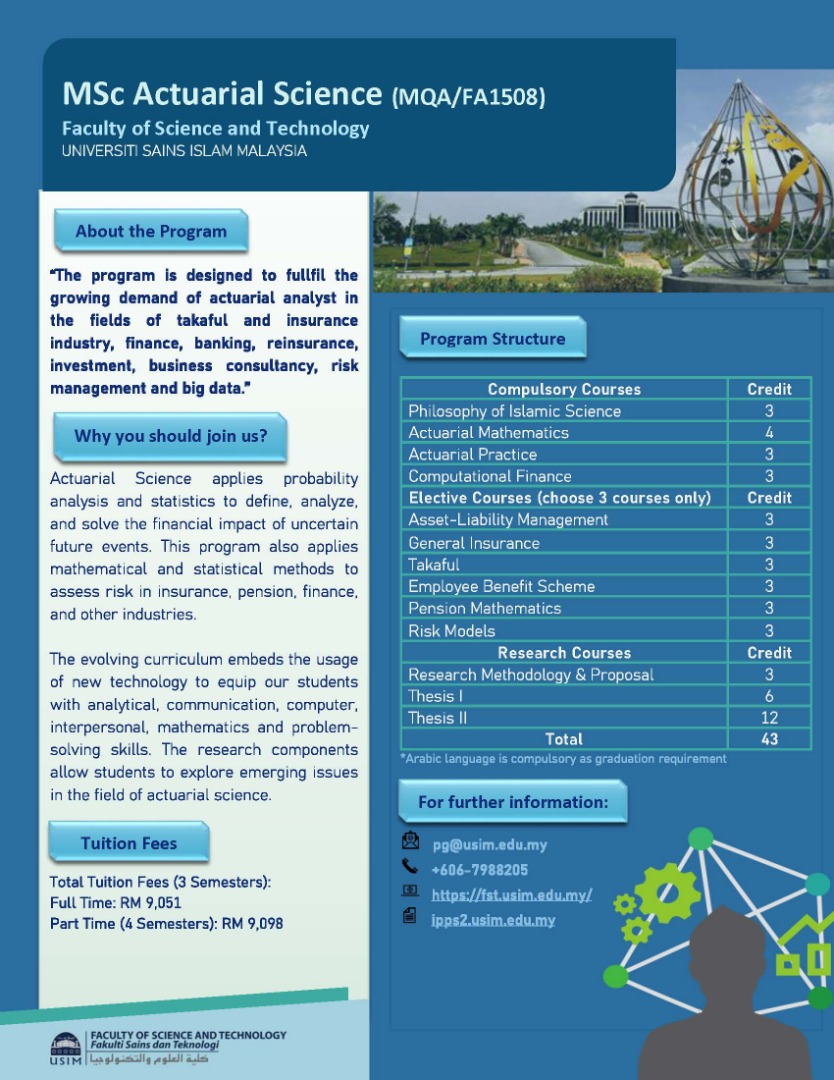Actuarial Science can be defined as applied science, focusing specifically on mathematics and statistics, economics and finance to solve financial problems involving uncertainty in value. Actuarial science knowledge will use mathematical skills and numeracy skills to identify, analyze, and solve problems in business and social. Those who want to follow this program must have a strong interest and ability in math.
This programme was first introduced in the 2016/2017 academic year. The programme is offered as a mixed mode programme. In 2018/2019 a revised curriculum was introduced. Then, in order to update the programme using MQF2.0, another revised curriculum is introduced and will be applied to the 2021/2022 academic year.

The objective of the programme is to produce:
- Actuarial practitioners who can apply knowledge and practical skills in the field of actuarial science to generate new knowledge while providing the best services to related sectors.
- Actuarial practitioners who are able to lead, work independently and in a team in solving problems as well as provide new ideas and subsequently convey information effectively.
- Actuarial practitioners who constantly strive to improve their knowledge and abilities by leveraging digital technology to solve problems in related sectors.
- Actuarial practitioners who practice ethical and professional values in providing services to related sectors.
At the end of the programme, students will be able to:
- Describe advanced knowledge in the field of actuarial science. (Knowledge)
- Adapt the knowledge and skills of actuarial science and think critically in solving problems through analysis and data processing techniques. (Cognitive Skills)
- Conduct research, analyze and interpret data for research use in the field of actuarial science. (Practical Skills)
- Demonstrate interactive communication skills and have social accountability as an educated person and able to work in a team. (Interpersonal Skills)
- Communicate orally and convey information effectively to all levels of society. (Communication Skills)
- Adapting digital technology in identifying, analyzing and processing data to solve problems in the field of actuarial science. (Digital Skills)
- Apply basic and advanced knowledge of mathematics and statistics to solve problems related to actuarial science by using appropriate techniques. (Numerical Skills)
- Demonstrates leadership characteristics, autonomy and responsible decision making in a teamwork environment. (Leadership, Autonomy and Responsibility)
- Demonstrates confidence, self -control and appropriate social skills and is committed to continuous learning. (Personal Skills, Entrepreneurial Skills)
- Demonstrate an understanding of the fundamentals of commercialization, ethics and law, as well as social issues related to the field of actuarial science. (Ethics and Professionalism)
Graduate in this field may enter the takaful and insurance industry, consultancy, funds, securities, stocks, finance, banking, marketing, reinsurance, investment, capitalization, health, transportation (land, sea and air), mining, oil, business and multinational companies . They can also be entrepreneurs, franchise holders or work in the public sector (such as in central banks, inland revenue, financial groups, public trustees, or education).